 Petzlover
Petzlover Labrador Husky is originated from Canada but Parson Russell Terrier is originated from United Kingdom. Labrador Husky may grow 35 cm / 14 inches higher than Parson Russell Terrier. Labrador Husky may weigh 37 kg / 82 pounds more than Parson Russell Terrier. Both Labrador Husky and Parson Russell Terrier has almost same life span. Both Labrador Husky and Parson Russell Terrier has almost same litter size. Both Labrador Husky and Parson Russell Terrier requires Moderate Maintenance.
Labrador Husky is originated from Canada but Parson Russell Terrier is originated from United Kingdom. Labrador Husky may grow 35 cm / 14 inches higher than Parson Russell Terrier. Labrador Husky may weigh 37 kg / 82 pounds more than Parson Russell Terrier. Both Labrador Husky and Parson Russell Terrier has almost same life span. Both Labrador Husky and Parson Russell Terrier has almost same litter size. Both Labrador Husky and Parson Russell Terrier requires Moderate Maintenance.
 The Labrador Husky is a purebred, spitz-type dog which looks much like a Wolf. People think because it has the name Labrador Husky it is a cross between a Husky and Labrador. What it essentially means is that it is a Husky dog which comes from the region of Labrador, Canada.
The Labrador Husky is a purebred, spitz-type dog which looks much like a Wolf. People think because it has the name Labrador Husky it is a cross between a Husky and Labrador. What it essentially means is that it is a Husky dog which comes from the region of Labrador, Canada.
It is a fairly unknown breed, but it is strongly believed that the dog was developed in Labrador, a region of northern Canada. In fact this is where the dog got its name from.
The attractive dog was used for sledding and it is also thought that the people of Labrador introduced Alaskan Malamute and German Shepherd in to add in some additional skills from these two dog breeds. The dogs were later domesticated so as to become companion animals.
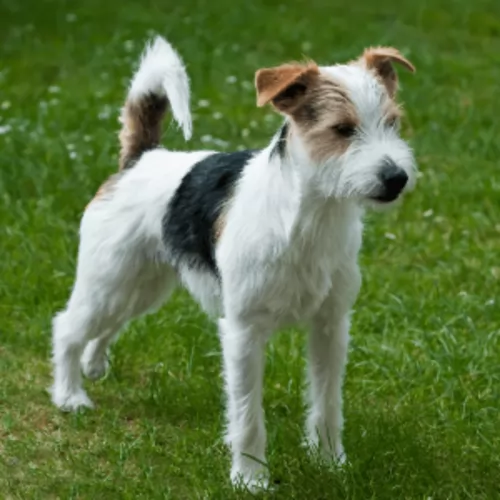 The Parson Russell Terrier hails from England and is a small to medium sized dog dating back to the 18th century. It is believed that Reverend John ‘Jack’ Russell was the developer of this dog. The Parson has always been involved with England’s sport of foxhunting.
The Parson Russell Terrier hails from England and is a small to medium sized dog dating back to the 18th century. It is believed that Reverend John ‘Jack’ Russell was the developer of this dog. The Parson has always been involved with England’s sport of foxhunting.
They’re spritely and quick and have been able to keep up on a hunt and take on a fox in its lair. The dog was first recognized in 1990 in the United Kingdom as the Parson Jack Russell Terrier and in America in 1997.
All the top kennel clubs recognize this dog as the Parson Jack Russell Terrier.
 The wolf-like muscular Labrador Husky is a large dog standing at 51 to 71 cm in height and weighing 27 to 45 kg.
The wolf-like muscular Labrador Husky is a large dog standing at 51 to 71 cm in height and weighing 27 to 45 kg.
Labrador is a place known for its icy winters and the dog’s double coat protects it from the freezing temperatures.
The color of the coat can be white, grey and white, solid black, solid grey as well as red and white. In fact there can be several different coat colors in one litter.
He has a long muzzle like the wolf and blue or brown slanted eyes. Sometimes you’ll get one blue eye and one brown eye. He has pointed ears, a nose which can be black or a pinkish color, bushy tail and paws which are webbed.
Labrador Huskies make wonderful pets and they are good with children, particularly when they’ve been properly trained and socialized.
Because they are dogs which have worked in a pack, they also get on well with other dogs in the home. You’ll notice that your Labrador Husky won’t often bark but he will howl like a wolf.
He is a friendly dog and not aggressive. He is intelligent too and you can teach him some basic commands such as sit, stay and lie-down.
The Labrador Husky is a dog used to having a job so if you bring him into your home, you’ll need to ensure that you set aside time to exercise him as he will become frustrated and bored if he isn’t involved in your family life.
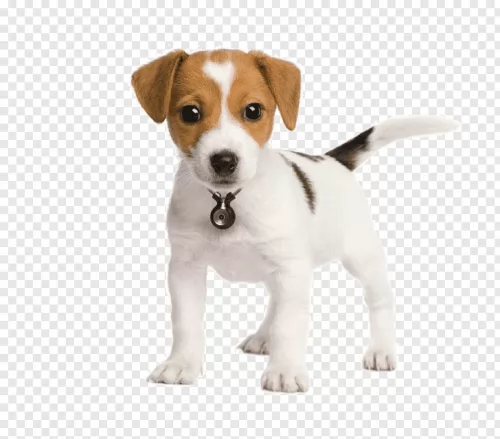 The Parson Jack Russell is essentially a white dog with black and tan or orange-fawn patches. He can be tri-colored too. The coat is either smooth, rough or broken.
The Parson Jack Russell is essentially a white dog with black and tan or orange-fawn patches. He can be tri-colored too. The coat is either smooth, rough or broken.
He stands at between 33–36cm tall at the withers and weighs between 5 and 8kg. Unlike the Jack Russell, the Parson Russell Terrier has longer legs. He has some longer hair on the head, legs and body. The ears are floppy wit the tip pointed forward. The tail has always been docked but when left long it it held high, slightly curving over the back.
Feisty, brave, cheeky and alert, the Parson Russell Terrier is an energetic dog who gets on well with children as he knows that this is essentially where his games come from.
He is bold and clever and you’ll be able to have him trained and socialized without any trouble. These little dogs are full of life and they are protective of their humans and their property, making excellent watchdogs.
 A Labrador Husky is a loyal, affectionate dog who is capable of forming a strong bond with his human family.
A Labrador Husky is a loyal, affectionate dog who is capable of forming a strong bond with his human family.
As a working dog, he loves being busy with fun and games and is playful and energetic and has good looks on his side too.
He is also an intelligent dog, strong-willed and confident and will require a firm, consistent owner who understands his need for regular exercise.
Social, lively and robust, the right environment will bring out all this beautiful dog’s best characteristics.
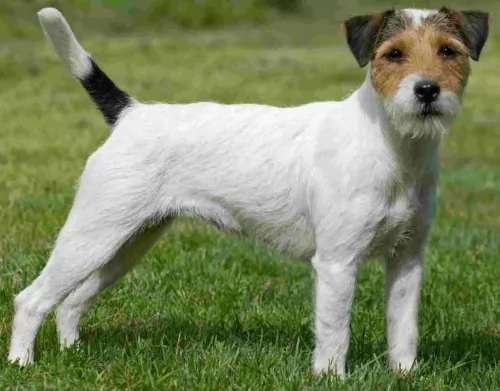 In general the Parson is a friendly,loving dog, fairly small but packed full of feisty personality.
In general the Parson is a friendly,loving dog, fairly small but packed full of feisty personality.
They make excellent pets for the entire family. He is an intelligent dog, but typical of most terriers he can be stubborn, but this can easily be fixed with training and socialization. With good care, he’ll make you a wonderful little pet and companion.
 Labrador Huskies can live to be between 10 and 13 years of age, and within a loving home he is generally looked upon as a healthy breed.
Labrador Huskies can live to be between 10 and 13 years of age, and within a loving home he is generally looked upon as a healthy breed.
There are always typical dog problems that might be found in your dog, and a couple of the more prominent ones are listed -
It can be a sad day for your Labrador Husky if he is diagnosed with hip dysplasia because if he is still used as a pack dog for pulling sleds it could well put him out of a job that he thrives on. It is a problem in the hips, and your once active dog may be in pain and may even battle to stand up after lying down.
He could even develop arthritis which can cripple him. He’ll need to get to the vet so that treatment can make life comfortable for him and to assist with pain.
Deep chested dogs are more prone to bloat, and your Labrador Husky is a deep chested dog. The stomach of the dog expands with gas, blocking gas escaping and putting pressure on the abdominal organs of the dog.
In some cases the stomach can twist and then immediate surgery will be required. This is a life threatening illness. Try and avoid feeding your dog one large meal and feed him smaller meals instead. These days you also get feeding bowls that encourage slower eating.
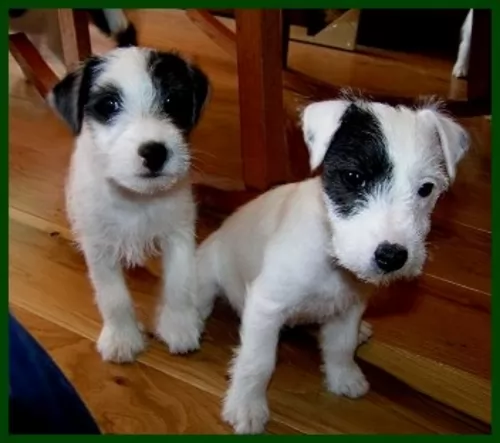 Your Parson Jack Russell can live to be between 12 and 15 years but nonetheless he does have some breed-related health issues to watch for.
Your Parson Jack Russell can live to be between 12 and 15 years but nonetheless he does have some breed-related health issues to watch for.
Eye conditions which can affect this dog include primary lens luxation,cataracts, corneal dystrophy and progressive retinal atrophy. With cataracts the lens of the eye develops a cloudy look resulting in poorer vision and sometimes blindness. Cataract surgery is available for dogs.
Your Parson Jack Russel should be lean and muscular and always full of energy. Avoid feeding him unhealthy treats which can lead to obesity and other health problems.
All kinds of parasites such as ticks, fleas and worms can invade your dog’s body. Roundworms, hookworms and tapeworms can cause havoc with their health and some of these parasites can even be transmitted to humans. It’s why it is important to get your puppy to the vet to be de-wormed and to get his first injections.
A liver disorder known as portosystemic shunt can mean that some of the blood supply doesn’t get to the liver and it doesn’t function properly. This will mean the liver can’t remove toxins from the bloodstream effectively.
 You’ll want to introduce a proper grooming routine for your pet as he has a thick double coat and he sheds throughout the year. Brush the thick coat 2 or 3 times a week, and set aside time to check for fleas and ticks and any appearance of lumps.
You’ll want to introduce a proper grooming routine for your pet as he has a thick double coat and he sheds throughout the year. Brush the thick coat 2 or 3 times a week, and set aside time to check for fleas and ticks and any appearance of lumps.
These are dogs which require a lot of vigorous exercise. Left chained or ignored he can become frustrated, run-down, bored and sick. He is a living, social animal that should only be brought into a household that acts responsibly towards him.
Choose high quality food which is for high energy dogs. If you give him dry kibble, mix in some home-made food occasionally to add variety, and also try to include some raw meat from time to time. Always ensure fresh, cool water is available.
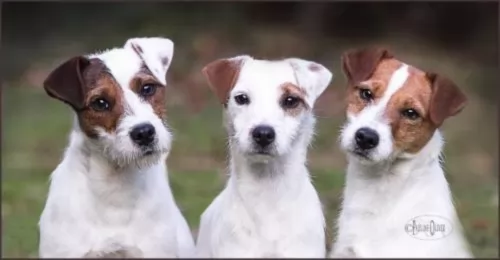 The Parson Russell Terrier has different coat types – the smooth and rough and both will require regular brushing. Rough coats will require plucking or clipping to avoid matting.
The Parson Russell Terrier has different coat types – the smooth and rough and both will require regular brushing. Rough coats will require plucking or clipping to avoid matting.
Check his eyes and ears regularly. Look inside his ears for excess wax and dirt which could lead to an ear infection. His nails should also be trimmed.
The best thing you can do for your Parson Russell Terrier if you don’t want your pet producing puppies is to have it spayed or neutered. Spaying for females or neutering for males decreases the likelihood of certain types of cancers too so it can be beneficial.
Diet is hugely important for a Parson Russell Terrier and the food you decide for him can impact his health. Many time those ‘treats’ you feed your pet do nothing more but give him a stomach ache.
It's tempting to pop chocolates, popcorn, nuts and ice cream into your pets mouth when he is so adorable but in the long run it is shortening his life. All he basically requires and needs is a simple, consistent diet of the top commercially manufactured foods mixed with some tasty home made food from time to time.
Boiled chicken, brown rice and vegetables such as sweet potatoes, carrots and spinach will do your pet wonders. Ensure he always has fresh, cool water available to him.